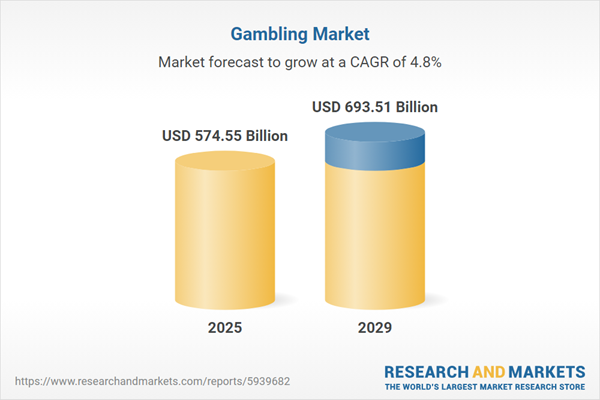
Gambling Market Dynamics
Discover the latest trends and key players in the gambling industry.
- Global market forecasts
- Online vs offline insights
- Technological impacts
- Safety and regulations
The gambling industry has grown significantly, becoming a multi-billion-dollar global sector driven by online platforms and regulatory changes.
The gambling industry has experienced remarkable growth over the past decade, evolving into a multi-billion-dollar global sector. With the rise of digital platforms and shifting regulatory landscapes, many countries have emerged as major hubs for gambling activities. In this article, we will explore the top 10 gambling countries, their market dynamics, and what makes them stand out in the global gambling landscape.
The global gambling market is projected to reach $693.51 billion by 2029, growing at a compound annual growth rate (CAGR) of 4.8% from 2024 to 2029. The Asia-Pacific region currently leads in market size, while Eastern Europe is expected to be the fastest-growing region. The expansion is driven by factors such as the legalization of gambling, rapid urbanization, increased internet penetration, and the popularity of mobile gambling apps.
| Rank | Country | Gambling Revenue (2025, USD Billion) | Key Features |
|---|---|---|---|
| 1 | United States | $261.0 | Largest market; rapid legalization of sports betting; strong online presence |
| 2 | China | $120.0 | Dominant in Asia; high participation rates; strict regulations |
| 3 | United Kingdom | $14.4 | Mature market; strong regulatory framework; high online penetration |
| 4 | Japan | $10.5 | Growing market; recent legalization of casinos and sports betting |
| 5 | Australia | $7.0 | High per capita gambling; strong sports betting culture |
The global gambling landscape is shaped by various economic, cultural, and regulatory factors.
Technological advancements and emerging markets continue to influence the growth trajectory of the gambling industry.

| 6 | Germany | $9.8 | Large population; regulated online gambling; strong sports betting sector |
| 7 | France | $8.2 | Legalized online gambling; strong lottery and sports betting markets |
| 8 | Canada | $7.5 | Expanding online gambling; provincial regulation |
| 9 | Italy | $6.8 | Growing online market; regulated sports betting and lottery |
| 10 | Spain | $6.5 | Legalized online gambling; strong sports betting and casino sectors |
Economic conditions play a crucial role in the popularity of gambling. Countries with higher disposable incomes and robust economies tend to have higher gambling rates. For example, the U.S. and the UK have large gambling markets due to their strong economies.
Factors include:
Regulations significantly influence gambling activities. Countries with favorable regulatory environments, such as the UK and Australia, have seen rapid growth in their gambling sectors. Conversely, strict regulations in countries like China have limited the growth of land-based gambling but have spurred the development of online platforms.
Key considerations include:
Cultural attitudes toward gambling vary widely. In some countries, gambling is seen as a social activity, while in others, it is viewed with skepticism. For instance, gambling is deeply ingrained in the culture of Australia and the UK, contributing to high participation rates.
Examples of cultural influences:
| Country | Gambling Revenue (2025, USD Billion) | Online Gambling Share (%) | Offline Gambling Share (%) |
|---|---|---|---|
| United States | $261.0 | 45% | 55% |
| China | $120.0 | 60% | 40% |
| United Kingdom | $14.4 | 55% | 45% |
| Japan | $10.5 | 35% | 65% |
| Germany | $9.8 | 50% | 50% |
| France | $8.2 | 48% | 52% |
| Canada | $7.5 | 42% | 58% |
| Australia | $7.0 | 40% | 60% |
| Italy | $6.8 | 45% | 55% |
| Spain | $6.5 | 47% | 53% |
The trend is clearly shifting towards online gambling. The global online gambling market is expected to reach $153.57 billion by 2030, growing at a CAGR of 12.01%. Online gambling is particularly popular in countries with high internet penetration and mobile device adoption, such as the U.S., UK, and Australia. Land-based casinos are still significant in regions like Las Vegas and Macau, but their growth is slower compared to online platforms.
Countries like India and Brazil are expected to enter the top ranks in the coming years due to increasing legalization and technological advancements. The Asia-Pacific region will continue to dominate, with Eastern Europe showing the fastest growth.
Technology is transforming the gambling industry. Innovations such as live casinos, mobile gambling apps, and blockchain-based platforms are enhancing the user experience and driving market expansion. The integration of artificial intelligence and data analytics is also improving risk management and fraud prevention.
The gambling industry is a dynamic and rapidly evolving sector, with the top 10 gambling countries leading the way in terms of market size and innovation. Economic conditions, regulatory environments, and cultural attitudes all play a crucial role in shaping the industry. As technology continues to advance and new markets emerge, the global gambling industry is poised for continued growth and transformation.
The global gambling market is projected to reach $693.51 billion by 2029, experiencing a compound annual growth rate (CAGR) of 4.8% from 2024 to 2029.
Legalization tends to lead to increased market growth as it opens up new revenue streams and attracts both operators and consumers.
Yes, the trend shows that online gambling is growing faster than offline gambling, with significant increases in mobile and digital platforms.
The top countries include the United States, China, the United Kingdom, Japan, and Australia, each contributing significantly to the global gambling revenue.
Future trends include the growth of emerging markets, advancements in technology like AI and blockchain, and an ongoing shift toward online gambling.
We thank our sponsors for their support in bringing this comprehensive analysis of the global gambling industry.

Discover the latest trends and key players in the gambling industry.

An in-depth look at the leading nations in the global gaming sector.
Japan's recent legalization measures are expected to significantly boost their gambling market by opening new venues and opportunities.
Brazil sees a surge in online gambling activities following new regulatory approvals for internet-based gaming platforms.
The integration of AI in casino operations has led to improved efficiency and enhanced player experiences.